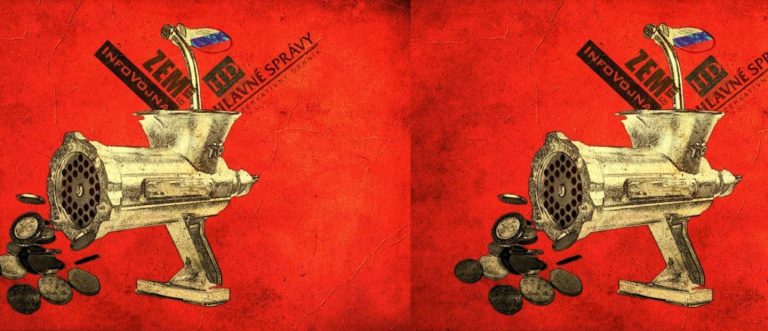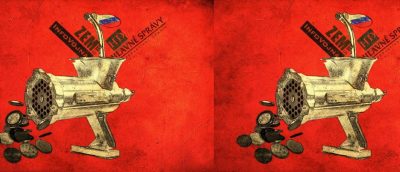Disinformation, propaganda and lies have been flooding the Slovak information space for a long time and, according to experts, represent an underestimated threat to the country. Behind the spread of lies and harmful content, a profitable business can be hiding under the guise of ideology. What does the financial background of the Slovak disinformation scene look like? In cooperation with Infosecurity.sk and the Prague Security Studies Institute (PSSI), we analyzed the business models of disinfo entrepreneurs. The list of “disinformators” was based on the public database of the Konspirátori.sk project, which has been monitoring Slovak disinformation and conspiracy websites for several years.
The original, Slovak version of this article was published on icjk.sk
In the last decade, dozens of portals that exist to spread lies and disinformation have sprung up on the Slovak Internet. “They hide behind ideology, but they can also be a means of earning money from the sale of advertising and through online stores,” points out Peter Jančárik, co-founder of the Konspirátori.sk project.
This is reiterated by the editor-in-chief of the Infosecurity.sk portal, Peter Dubóczi: “Disinformation websites personify to the letter what we call the attention economy. And at the same time, they amplify the content of other actors who often operate with hate politics.” According to the analysis of Infosecurity.sk and PSSI, spreading disinformation is sometimes a profitable business. The most visited portals can earn several thousand euros per month just from advertising. They are often intransparent and in some cases strive for total anonymity.
Disinformation websites have managed to achieve a reach that, in some cases, is comparable to regular media: “They have relatively high numbers of visits and, at the same time, they are also significantly present on social networks,” says Dubóczi.
We put the analysts’ findings in the context of the financial results of the website operators. For example, the disinformation website and print magazine “Zem a vek” (“Earth and Era”) had sales of almost 360,000 euros in 2021. The company behind the conspiracy magazine has a long-term annual turnover of around 300 to 400 thousand euros. Tens of thousands of euros are also in a transparent account (where all executed transactions are public) to which fans send money.
One of the most influential disinformation spreaders in Slovakia, Hlavné správy (Main News), which was blocked by the state after the start of Russian war against Ukraine in 2022, has lower sales (in the tens of thousands), but has been growing for a long time and shows a higher net profit. For 2021, the company’s sales were 320,000 euros with a profit of over 20,000 euros. The year before, the company achieved a profit of more than 85,000 euros. The Russian embassy in Bratislava also paid for advertising on their website in the form of PR articles.
The site’s owner, Robert Sopko, even received financing from Marian Kočner in 2018. Kočner is currently on trial for ordering the murder of the investigative journalist Ján Kuciak. Kuciak and his fiancée Martina Kušnírová were assassinated in 2018. In 2022, Kočner was acquitted, but the case is now before the court of appeal. Kočner was, in the meantime, sentenced to 19 years for an unrelated economic crime.
Dozens of other websites make money from advertising and from the fact that they use conspiracies and delusions to create a crowd of loyal fans who are willing to send them money or buy t-shirts and bags. Also, in Slovakia, legal and natural persons can assign 2 percent of their income tax directly to different civic associations and NGOs. The measure was created to provide means for financing of the third-sector activities and charities in the country. Allocation of individuals’ 2 percent of paid income tax is one more way these sites get money.
And in some cases, fans even spend money on quack remedies and medical books that they believe will help them with medical problems—and that can lead to damage to their health. This is also pointed out by doctors, authors of the website Lovci šarlatánov (The Hunters of Charlatans), which deals with medical hoaxes.
One such website that used to spread medical hoaxes and sell such products, Báječný lekár (The Wonderful Doctor), went offline hours after we sent our questions for comment. All it took to take them offline was for someone to find out who actually owned it.
Source: Similarweb – the graph only contains the sites with more than 100-thousand visits. The list of analyzed entities also contains the eREPORT.sk portal, which the project Konšpirátori.sk puts into the “gray zone” between information and disinformation actors.
Experts agree that for an effective fight against disinformation, it is crucial to understand the links between actors in the disinformation scene, as well as their organizational and financial backgrounds. In 2021, the Ministry of Defense estimated that the top advertising earner was Hlavné správy (Main News). According to the ministry’s estimate, the site’s revenue could reach up to 18,499 euros per month. According to the same estimate, another disinformation website, Hlavný denník (Main Daily), may have received a maximum of almost 2,400 euros; Infovojna (Infowar), more than 3,000; and Zem a vek (Earth and Era) could have received a maximum of less than 200 euros per month from advertising.
The Slovak National Security Authority’s temporary blocking of selected disinformation sites after the start of Russian invasion of Ukraine in 2022 may have dampened those numbers for a while. However, according to the author of the study, Dominik Štepanovič, it is impossible to estimate the exact financial consequences of the measure.
The analyst also doubts that advertising revenue is the main source of funds for disinformation websites. “For the server costs they have, for them to have cyber security in the context of how many visitors they have, they have to have secondary resources as well,” he says.
Advertising on disinformation websites works similarly to any other website, Peter Jančárik, co-founder of the Konspirátori.sk project, explains: “Today, many websites use large advertising platforms such as GoogleAds, where as a website, a publisher, you rent your banner area to some platform, which then places various brands.” Therefore, he said, many companies have no idea that their ads are displayed on problematic pages and thus financially support disinformation content.
In our analysis, we took a detailed look at the background of those disinformation websites that are aimed at trying to generate financial profit. We have identified three operating models, with disinformers often combining them to avoid transparency. They are: model of limited liability company, model of civil association, and model of legal vacuum.
When mapping the ownership background of disinformation websites, we used information in publicly available registers and on the websites of the disinformators themselves.
Hoaxes, L.L.C.
The players of the disinformation ecosystem in Slovakia with the highest numbers of visitors and reach have been trying to build the image of a legitimate, alternative media for many years. Some of them do not hide their finances and run their activities under a classic company, albiet usually a limited liability company.
This model is used by Hlavné správy (Main News) and Armádny magazín (Army Magazine), both of which belong to the Košice-based company HEURÉKA EVOLUTION, L.L.C. Behind the Zem a vek (“Earth and Era”) magazine is the company SOFIAN, L.L.C. with headquarters in Bratislava.
Companies are recorded in Slovakia’s WHOSE business register, where you can find out who owns them. The same applies to their financial results. By law, they deposit financial statements in the public register. It is possible to learn there what kind of income and profits they have and where they could have come from—whether it is the sale of subscriptions, advertisements, or even direct financial donations from readers.
The Hlavné správy (Main News) portal, which spreads Russian propaganda and disinformation, was created in 2012. The company HEURÉKA EVOLUTION, which the portal lists as its publisher, is an advertising agency of the editor-in-chief Róbert Sopko, whois its sole owner and manager. Until 2015, its monthly sales averaged around 2,000 euros. After that year, they quadrupled and the company ended up making a profit. In 2022, that profit was already 320,843 euros.
The website is also connected to a civic association called Heuréka evolution, which was established in 1998.
Civic associations in Slovakia are not supposed to be established for the purpose of creating profit and doing business. They can only do business if it is an activity related to their primary focus and they must have a self-employment license for it. In a way, under the law, a civic association is a legal person and this person can be self-employed.
HEURÉKA EVOLUTION-Hospodárske stredisko, o.z. (HEURÉKA EVOLUTION-Economic center, civics association) has held a self-employment license since 2001. We cannot learn much about their financing, as entrepreneurs with self-employment licenses or civic associations do not publish data and do not even have a transparent account.
We do know, however, that, since 2009, the civic association Heuréka evolution has been the recipient of some individuals’ 2 percent of taxes. The disinfo player’s best year for this was 2019, when the amount exceeded 3,500 euros.
The disinformation website Hlavné správy (Main News), which attracts millions of clicks a month, also offers advertising to advertisers. A web banner costs 2,000 euros, a PR article on the website costs 1,000 euros.
The political party SME RODINA (We Are Family) of the current speaker of the Parliament, Boris Kollár, also bought PR articles on this disinfo portal. For this, according to the party’s annual report for 2021, they paid Heureka Evolution 57,600 euros.
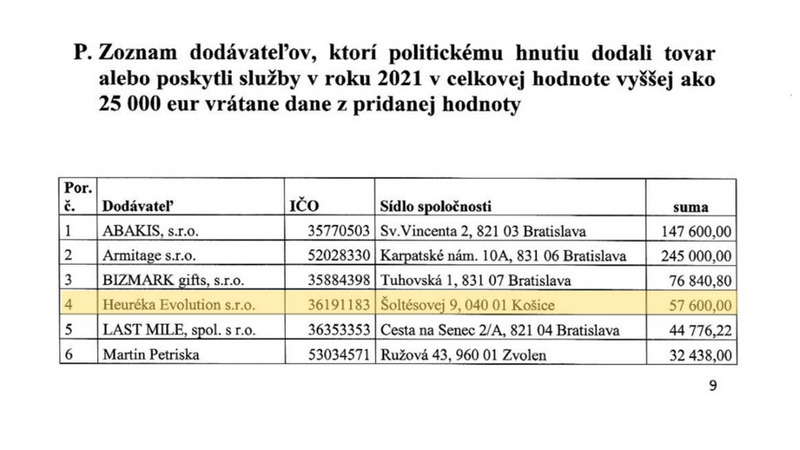
Source: Annual report of the political party SME RODINA (We Are Family) for 2021, accessed on the website of the Ministry of Interior of the Slovak Republic.
According to Róbert Sopko’s earlier statement to the ICJK, the Russian embassy in Bratislava also ordered promotional texts from him. It was “bilingual PR articles, in Slovak and Russian, which informed Russian citizens where and when they can come to vote in Slovakia.” Sopko also stated that “if the Russian embassy is interested in such PR articles, we will publish them in the future as well as for any other embassy. It is a normal business relationship and we have no reason not to publish such articles.”
Other suspicions of a connection between Hlavné správy (Main News) and the Russian Federation have also surfaced in recent years. Since 2015, a Russian citizen Yevgeniy Paľcev (he appeared under the pseudonym Eugen Rusnák), whose articles spread Kremlin propaganda, has written for them. According to the findings of Denník N, Paľcev has contacts with Russian media group Rossija Segodňa (Russia Today), an agency funded by the Kremlin.
Another author who wrote for Hlavné správy (Main News), Bohuš Garbár, cooperated with Russian intelligence for money. As seen in an infamous video, he was recruited by the military attaché of the Russian embassy, Sergei Solomasov. At the end of February 2023, Garbár was sentenced to three years’ probation and fined 15,000 euros for espionage. He was represented in the process by former prime minister Ján Čarnogurský, chairman of the Slovak-Russian Society, a strange pro-Russian civic association. It is with this organization that Hlavné správy (Main News) collaborates in creating some of its articles.
Both portals of Sopko’s Huréka Evolution—Hlavné správy (Main News) and its sister Armádny magazín (Army Magazine)—were temporarily blocked by the National Security Authority after the beginning of the Russian war against Ukraine in 2022. The reason for shutting down the websites was the spread of Russian propaganda, disinformation, and suspicion of funding by Russia. However, the state never published any more details.
The portal was also mentioned in connection with Marián Kočner, sentenced to 19 years in a promissory note case. In communication with oligarch Norbert Bödör (who was himself charged for leading an organized criminal group that controlled the police) via Threema, he identified himself as a “shareholder” of Hlavné správy. When confronted with these findings in the past by investigative journalists who got hold of the Threema as part of the huge OCCRP investigation into Ján Kuciak’s murder nicknamed “Kočner’s Library,” editor-in-chief Róbert Sopko rejected the accusation and called it an attempt to discredit him.
The data from Kočner’s Library also contained evidence that Kočner really paid Hlavné správy and that the editor-in-chief of this disinformation website knew about it. “Thank you also for the support that has reached the account,” Sopko wrote to Kočner via Whatsapp in 2018. It is interesting that, in 2018 and 2019, Heureka evolution’s income from 2 percent of certain individuals’ taxes increased. While in 2017, according to Finstat, they received less than 900 euros, in 2018, they got more than 2,800 euros; in 2019, more than 3,500 euros. A year later, the income from the 2 percent tax share fell to less than 550 euros.
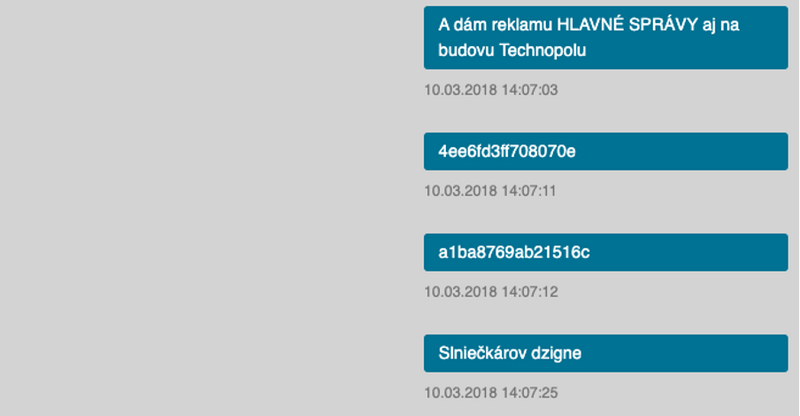
Excerpt from Threema. “And I will also put a [billboard] commercial for Hlavné správy on the Technopol [huge building Kočner owned in Bratislava]. The Sorosites will shit themselves,” kočner wrote to Alena Zsuzsová, who has been found guilty for ordering the murder of Ján Kuciak, but also awaits the court of appeal. Source: brucho.blbec.online
(In)transparent account
Behind the conspiracy portal and magazine Zem a Vek (Earth and Era) is the company SOFIAN, L.L.C.. (it also covers the video portal of Zem a Vek). Based in Bratislava, it was founded in 2008 by the editor-in-chief of the magazine, Tibor E. Rostas, convicted in 2021 for anti-Semitic statements and today the sole partner of the company. In addition to that company, since 2012, Rostas also has a civic association SOFIAN Publishing, through which he receives thousands of euros annually from the two percent share of the tax paid by his supporters.
Since 2017, it has received more than 10,000 euros every year, while in 2022, according to Finstat, the amount exceeded 13,400 euros. According to the available data, in addition to covering operational expenses, administration and the organization of meetings and congresses, these funds were used for “delivery of remittances to homes and the socially weaker”, i.e. delivery of unsold copies of the magazine. In 2018, they spent over 11,000 euros for this purpose.
According to Rostas, the Zem a Vek project is financed by his supporters and readers. The publishing house has an allegedly transparent account for sending voluntary contributions. However, this one is a special account, different from the accounts of the company SOFIAN, L.L.C. and of the civic association. It is only transparent when it comes to the donations—in the total amount exceeding 43 thousand euros—and shows almost no expenses from 2022. The financial operations of the company and the civic association behind Zem a Vek thus remain hidden in their current accounts.
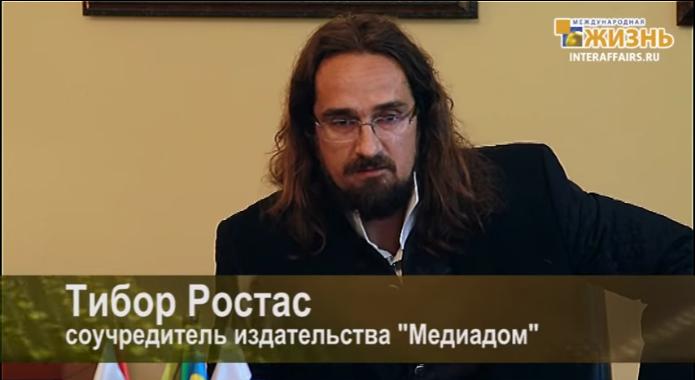
Tibor Rostás visited Moscow in 2015, where spoke at an event organized by “The International Affairs” magazine, about the need to create a media house in Slovakia, which would contain magazine, daily, radil, TV, and online. Source: interaffairs.ru
Questions also arise regarding the financial results of the company SOFIAN, L.L.C. In 2014 and 2015, revenue from the sale of products and revenue from the sale of services was recorded separately. The financial statements for these two years reveal that the revenue from the sale of own products was 0 euros. The company’s entire annual turnover comes from the sale of services. Revenue from the sale of goods are completely negligible in all years, despite the fact that it is a company that publishes a printed magazine and sells it directly at newsstands.
As in the case of Hlavné správy, suspicions of a connection to the Russian Federation also appeared around Zem a Vek. In 2014, according to the leaked audio recording, Tibor E. Rostas was supposed to directly ask representatives of the Russian embassy for financial support. It is not possible to determine from the available data whether he received it.
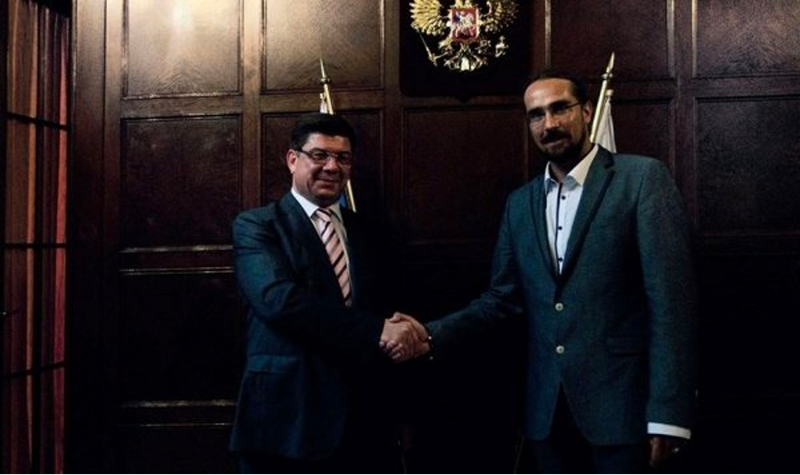
The editor-in-chief of Zem a Vek in the company of the former Russian ambassador to Slovakia, Pavel Maratovich Kuznetsov. Source: Blog/DenníkN
We also sent questions to Zem a Vek. Rostas’s colleague wrote back to us that “Mr. Rostas is on a business trip outside Slovakia and does not have the opportunity to answer.” On the same day, however, Tibor E. Rostas himself published an article about ICJK questions on the Zem a Vek portal, which did not contain answers to our questions, but did contain ad hominem attacks. We therefore asked him for answers again, but did not receive them by the deadline.
“Not for profits”
Several important actors of the disinfo scene operate legally as civic associations. Until recently, that meant that the articles of association were not published. Their financial statements are still transferred to a non-public register. Civic associations, like foundations, do not even publish annual reports. Therefore, if they do not have a transparent account, or do not offer information voluntarily, almost nothing can be learned about their functioning and financial movements from public sources.
According to the law, civil associations should not be created for the purpose of creating profit and doing business. However, the paradox is that they actually can run a business if it is an activity that is related to their primary focus and is an additional source of income, which can then, in theory, to be used by civil associations in order to fulfill their official primary goal. According to a statement from the Ministry of the Interior of the Slovak Republic, “the essence is that the profit of the civil association from such activity is not distributed among the founders or members of the association, but remains fully in the property of the association and is used for its further activity.” In order to do business, civic associations must have an self-employment license.
A typical example of a disinformation website that functions solely as a civic association is Hlavný denník (Main Daily), which was blocked by the National Security Agency for several months last year due to problematic content, including disinformation and political propaganda.
Civic association Verbina, which is based in Bratislava and was founded in 2019, is behind the portal. It is registered for activities in the field of IT and PC. In its statutes, it states that the goal of its activity is to increase the level of public debate, education, and development of democratic mechanisms through a high-quality internet news portal.
It also declares non-partisanship in its basic document. However, the activities of Hlavný denník are connected with several political actors, like, for example, with the fringe parties Národná koalícia (National Coalition) or Socialisti.sk (Socialists.sk).
The operation of the website can be supported by an individual donation. In addition, the newspaper offers the possibility of advertising, with prices ranging from 600 to 2,000 euros per month, depending on the size of the advertising space and its location. Boris Kollár’s SME RODINA (We Are Family) political party also advertised on the website in the past. In 2021, it paid over 27,000 euros for advertising. The civic association Verbina established its business via self-employment license only at the end of that year. We sent questions to Hlavný denník. However, they did not respond to our message.
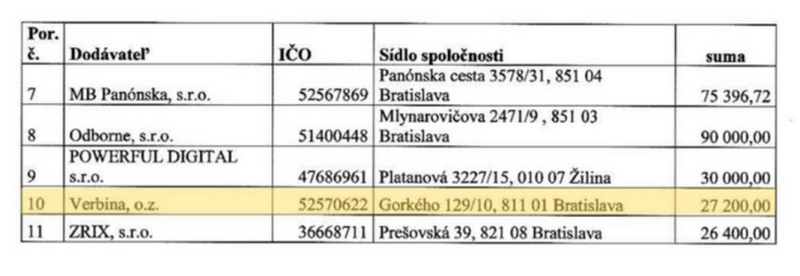
Source: Annual report of the political party SME RODINA (We Are Family) for 2021, accessed on the website of the Ministry of Interior of the Slovak Republic.
After the start of Russia’s war of aggression against Ukraine in 2022, the National Security Authority of Slovakia also blocked the InfoVojna (InfoWar) portal and internet radio for half a year. It is operated by the civic association INFO VOJNA, based in Banská Belá, and was founded at the end of 2012. Its chairman is Norbert Lichtner.
The InfoVojna website receives funding from several sources. First, through voluntary contributions made through the site or by donating 2 percent of one’s tax to the civic association. Thanks to this, it received more than 37,000 euros in 2022, and in 2021, it also made almost 37,000 euros just from the assigned 2 percent of tax paid. It may use these funds to finance the rental of premises, operation of the broadcasting studio, the implementation of the broadcasting itself, or the payment of remuneration to the debaters.
The site also operates an e-shop selling books and advertising items. However, the online store does not meet Slovakia’s legal requirements, as the business name, registered office, e-mail contact, telephone number and tax identification number of the entity that operates the store are not listed on it. However, Lichtner’s civic association does have a self-employment license for publishing, retail and wholesale.
The site also receives voluntary contributions from fans. Their total balance is published every month. However, it is not traceable. At the time of publication of the article, InfoVojna had collected 4,002 euros for June 2023.

Source: InfoVojna
An identical model is used by another disinformation internet radio Slobodný vysielač (The Free Radio). This was also associated with the name of Norbert Lichtner in the past. The only difference is that Slobodný vysielač’s online store is covered by a civic association: ZUdruženie ľudí pre lepšiu budúcnosť (Association of people for a better future) with headquarters in Banská Bystrica. In 2021 and 2022, this association also collected more than 10,000 euros from the two percent tax share.
We sent questions to Norbert Lichtner and InfoVojna to all the emails listed on the website but did not receive any response.
Disinformers hidden in the legal vacuum
Anonymous profiles and pages are an integral part of the disinformation ecosystem everywhere in the world. It is thus not surprising that several of the portals with problematic content analyzed by us operate in a legal vacuum. The site is not covered by any legal entity. You will not find the names of the authors of the articles, nor the name of the publisher, or any legal or physical person responsible for the content.
According to Petr Jančárik from Konspirátori.sk, laziness or amateurism may be behind it. But he adds that there is also intent behind it, with disinformation actors learning to “walk a fine line” so that their content cannot be challenged legally.
An example is the portal Mimoriadne správy (Extraordinary News), which has a page on Facebook with a large reach and also pays for advertising. The administrator or owner of the page is not verified despite the fact that it is a political advertisement, which means stricter Faebook rules should apply.
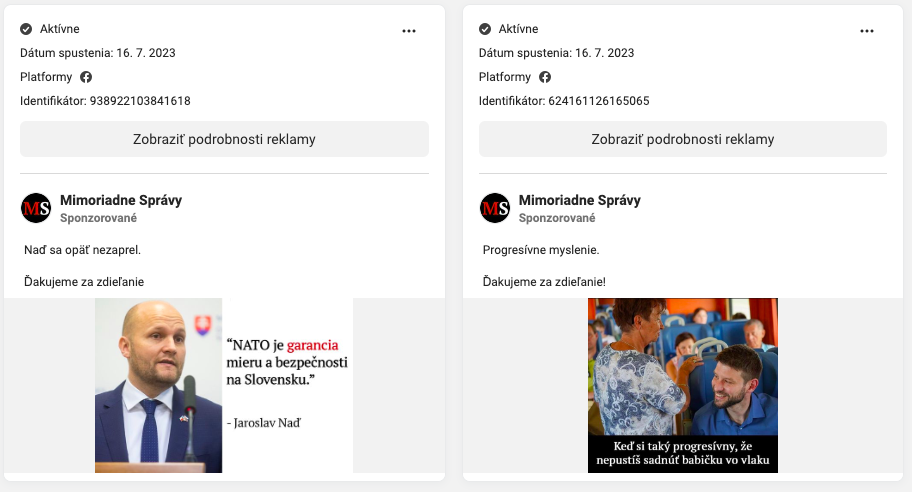
Currently active paid ads on Facebook of Mimoriadne správy. Quote of ex-minister of Defense Jaroslav Naď “NATO is a guarantee of peace and security in Slovakia” is commented by the site saying “Naď again could not help himself”. Another one about “progressive thinking” shows a photoshopped image of the leader of Progresívne Slovensko (Progressive Slovakia) party on a train and says “when you are so progressive you will not let a grandma to sit down.” Source: AdLibrary/Meta
Similarly, Slovanské noviny (Slavic News) also operates in a legal vacuum. Although they do list a specific legal entity as their publisher, that entity does not actually exist. Slovanské noviny states on several subpages of its website that its publisher is civic association Spoločesto Slovanov (Community of Slavs). However, you will not find such a civic association in any register.
From the domain information, it can be deduced that the website, which runs ads from which there must be some kind of revenue, is in fact operated by a company SS Group, L.L.C. The site is the largest re-sharer of links to the pro-Kremlin disinformation website NewsFront. It also directly mentions it as a partner of its portal.
We contacted the admin of Mimoriadne správy via Facebook Messenger, and can see that he viewed, but did not respond to, our messages. We also contacted the real owner of Slovanské noviny, which is the company SS Group, and its owner Slavomír Stach, who admitted to being associated with the website in the past on his LinkedIn profile. However, he did not respond to our messages.
This article was created in cooperation with Infosecurity.sk and the Prague Security Studies Institute, with the support of the Open Information Partnership.
 Support independent investigative journalism in Slovakia,
Support independent investigative journalism in Slovakia,
you can donate here.
Tomáš Madleňák is a Slovak journalist who has worked for the Investigative Center of Ján Kuciak since 2020. He is based in Bratislava.
Karin Kőváry Sólymos is a Slovak journalist at the Investigative Center of Ján Kuciak. Previously, she was an editor and presenter at the Hungarian channel of the Slovak public service media. During her university years, she was an analyst for the only fact-checking portal in Slovakia. She was a recipient of the Novinarska Cena 2022.


